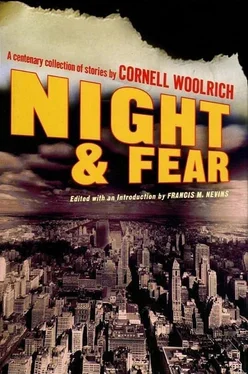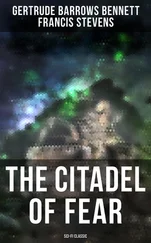She could hear him coming up slowly, a step at a time, with the deliberation of a machine. She nearly went a little mad herself, waiting for him to get to her room.
He stopped just outside the door. She went up on her toes. He started to push the door slowly inward. It swung around and left his head exposed, sidewise to her, making a perfect target. She swung with all her strength.
She could feel the sudden loss of weight as she swept it forward. She knew what had happened even before she heard it bounce off the wall behind her. The hammer-head had flown off. Just the stick part fell harmlessly across his skull, not heavy enough to do anything but sting him a little.
He swung around and wrenched it from her hands. She scuttled back along the wall, like a mouse looking for a hole. He caught up with her on the other side of the room, over by the window. The chase stopped.
Her flailing hand went down into something soft. Earth — around a potted plant standing on the inside window-ledge. It went over with a shattering crash, but not before she’d got a handful of it. She waited until his eyes were so close to her face she couldn’t miss. She didn’t.
He was blinded for a minute, pawing helplessly at his eyes. She ducked under his arm, streaked across to the door and out. She knew she’d never get downstairs in time, so she went up instead, heading for the roof. He was quicker than she’d thought he’d be. He tore out after her, nearly at her heels. There was a lightweight rattan settee just short of the roof staircase. She threw that over, blocking him. He went sprawling over it. She got up to the top, opened the trap door, and climbed out into the open.
The roof was gabled and covered with treacherous slates. She skidded down them as far as a squat brick chimney. She got below it and held on with both arms. She couldn’t go any lower than that. It sloped down to a leaded rain-gutter and then dropped off into space.
She heard him coming after her. He must have seen her arms looped around the chimney. Some of the slates detached themselves at his unseen approach and went slithering past where she crouched.
Suddenly a hand touched her arm. It was ice-cold — like the fingers of death. She screamed and tore her arms away — or tried to. One swung out free, but he’d caught the other by the wrist. Braced on the other side of the chimney, he held her in an iron grip. She dangled there, legs threshing helplessly against the slates.
A light suddenly slashed up at them from below, blinding her. It was the adjustable spotlight of a car. She heard a voice cry out hoarsely, “Good heavens, look at the two of them!” There were figures moving around down there on the lawn, but they were too late. They might as well not have come.
Terry’s voice reached her from far away, as in a dream. Crooning in reassurance, and yet half wild with smothered terror. “Ginny girl, edge over, edge over, pull more of his arm out!”
She braced herself against the unstable slates, then hitched violently away from the chimney, almost leaning flat against the roof. His hand came around the corner of the chimney, still welded to hers. His wrist came, then a little of his forearm. But he was strong. She couldn’t pull him any farther.
Something went bang! and chips of brick flew off. Something went bang! again, and the hand jarred open. She was prone against the roof. She just skidded a little farther down and stayed there, hanging on by a hair’s-breath.
Something came tumbling down around the other side of the chimney and over into the night, clawing at nothing as it went.
The light went out, in order not to blind her and make her lose her precarious hold. She was all by herself now. She knew that all she had to do was just hang on a little while longer. Then Terry climbed out against the night-sky over her, with a rope around him. He came scaling down to where she was and his reassuring arms went around her.
In the car, on the way back to the city, they talked about it.
“They’ll give you your promotion now,” she said.
“I’m not sure that you shouldn’t have it instead.”
“How did you get out there when you did?”
“Nothing very brilliant. It was my night off and you’d promised to meet me at the Greek’s. You never break your word. If you couldn’t come I knew you would have called me there or sent some message. That brought on a hunch that something was wrong. It was just a hunch, but I couldn’t fight it down. So finally I gave in to it. Then when I couldn’t reach the place by telephone, I remembered that you’d said this caretaker was out here at all times, and that did the rest.”
“There’s only one thing I don’t understand. That man I was with earlier tonight... He seemed to fit the specifications so perfectly.”
He laughed. “I heard about that. He told us about it afterwards. You were a little wide of the mark that time. Know who that was? A Scotland Yard man, sent over here to work on the case. He’s been in for several conferences with us.”
“But he followed me the other night! The tread was the same!”
“I wouldn’t be surprised. He might have had some idea of using you as live bait. The cat following the cheese in hopes of seeing the rat go for it.”
“I’m afraid I wasn’t very good as your deputy — confusing detectives with criminals.”
“You got him, didn’t you? And neither Scotland Yard nor Center Street did. Pretty good for one little girl on her own.”
“There’s just one thing more. There was no blackout tonight. Why did he go for me like that? I thought it was only during...”
“He must have recognized the man he saw you with as a Yard operative. Maybe he’d already seen him during some previous investigation over there. When he saw the two of you together like that, he was afraid you were beginning to suspect him, thought you might be on the point of divulging his identity and whereabouts, if you hadn’t already. That was enough to bring on the so-called shock without the aid of any blackout. Only it was a very sane, level-headed ‘shock’ in this case. He knew what he was doing. Well, the fall to the ground did what the hangman’s rope was waiting to do, and a lot more cheaply — broke his neck.”
She pressed her face against his coat. “I’m glad it’s over.”
“Sure. It’s all over and done with now. In a little while you’ll forget all about it.”
“All but one thing. I’ll never be able to look at a white rose again as long as I live.”
Afterword to “The Death Rose”
In “The Death Rose” ( Baffling Detective Stories, March 1943) Woolrich recycled the storyline of his classic “Dime a Dance” (1938): a young woman stakes herself out as bait to trap a psychotic serial killer of women. This time she’s a wealthy debutante rather than a taxi dancer, the tale takes place during Manhattan’s World War II practice blackouts rather than in peacetime and the narration is in third rather than first person. As so often in Woolrich the suspense depends on wild coincidence — how likely is it that every man Ginny meets would match the killer’s psychological profile so closely? — but while his emotional roller-coaster is spinning, flaws like this are all but unnoticeable. The radio version of the story, broadcast on the CBS series Suspense (July 6, 1943) and starring Maureen O’Hara as Ginny, captured the noir mood so miraculously well that I’m half convinced Woolrich wrote the script himself.
“He won’t hurt me,” she answers understandingly without taking her eyes from mine. “We used to be in love.”
Used to? Then that’s why I’m dying. Because I still am. And you aren’t anymore.
Читать дальше












